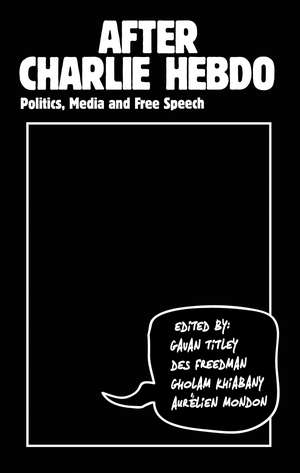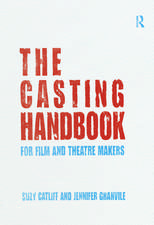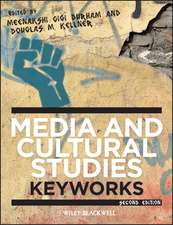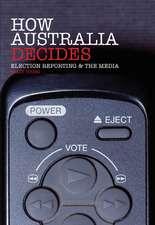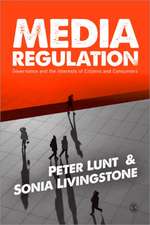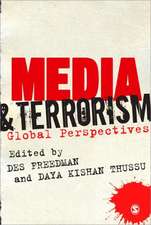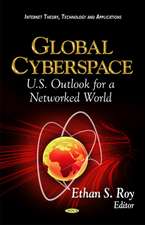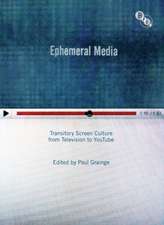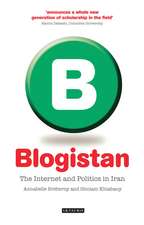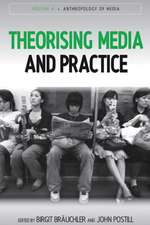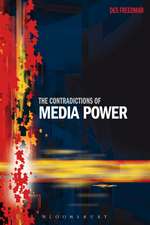After Charlie Hebdo: Terror, Racism and Free Speech
Editat de Gavan Titley, Des Freedman, Gholam Khiabany, Aurélien Mondonen Limba Engleză Paperback – 14 dec 2017
| Toate formatele și edițiile | Preț | Express |
|---|---|---|
| Paperback (1) | 135.54 lei 3-5 săpt. | |
| ZED BOOKS – 14 dec 2017 | 135.54 lei 3-5 săpt. | |
| Hardback (1) | 510.83 lei 6-8 săpt. | |
| ZED BOOKS – 14 dec 2017 | 510.83 lei 6-8 săpt. |
Preț: 135.54 lei
Preț vechi: 145.96 lei
-7% Nou
Puncte Express: 203
Preț estimativ în valută:
25.94€ • 28.17$ • 21.79£
25.94€ • 28.17$ • 21.79£
Carte disponibilă
Livrare economică 01-15 aprilie
Preluare comenzi: 021 569.72.76
Specificații
ISBN-13: 9781783609383
ISBN-10: 1783609389
Pagini: 288
Dimensiuni: 140 x 216 x 25 mm
Greutate: 0.42 kg
Editura: ZED BOOKS
Colecția Zed Books
Locul publicării:London, United Kingdom
ISBN-10: 1783609389
Pagini: 288
Dimensiuni: 140 x 216 x 25 mm
Greutate: 0.42 kg
Editura: ZED BOOKS
Colecția Zed Books
Locul publicării:London, United Kingdom
Descriere scurtă
Notă biografică
Gavan Titley is a senior lecturer in Media Studies in Maynooth University, and a Docent in the Swedish School of Social Science, Helsinki University. He is the author of The Crises of Multiculturalism: Racism in a Neoliberal Age (with Alana Lentin, 2011) and Racism and Media (forthcoming, 2018) and his most recent edited book is National Conversations? Public Service Media and Cultural Diversity (2013). He is a co-editor of the book series Challenging Migration Studies.
Des Freedman is professor of Media and Communications at Goldsmiths, University of London. He is the author of The Contradictions of Media Power (2014) and The Politics of Media Policy (2008). He is also an editor of the journal Global Media and Communication.
Aurelien Mondon is a senior lecturer in French and Comparative politics at the University of Bath. His research focuses for the most part on the concepts of populism and racism and their impact on democracy. His first monograph A Populist Hegemony? The mainstreaming of the extreme right in France and Australia was published in 2013.
Gholam Khiabany is a senior lecturer in the Dept of Media and Communications at Goldsmiths, University of London.
Cuprins
Acknowledgements
Introduction: Becoming symbolic: from Charlie Hebdo to ‘Charlie Hebdo’
Gavan Titley
Part I: The Contested Republic
1 Charlie Hebdo, Republican secularism and Islamophobia
Aurélien Mondon and Aaron Winter
2 The meaning of ‘Charlie’: the debate on the troubled French identity
Philippe Marlière
3 After the drama: the institutionalization of gossiping about Muslims
Valérie Amiraux and Arber Fetiu
4 A double-bind situation? The depoliticisation of violence and the politics of compensation
Abdellali Hajjat
Part II: The Long ‘War on Terror’
5 The Whiteness of innocence: Charlie Hebdo and the metaphysics of anti-terrorism in Europe
Nicholas De Genova
6 The visible hand of the state
Gholam Khiabany
7 Symbolic politics with brutally real effects: when ‘nobodies’ make history
Markha Valenta
8 Extremism, theirs and ours: Britain’s ‘generational struggle’
Arun Kundnani
Part III: Media Events and Media Dynamics
9 From Jyllands-Posten to Charlie Hebdo: domesticating the Mohammed cartoons
Carolina Sanchez Boe
10 #JeSuisCharlie, #JeNeSuisPasCharlie and ad hoc publics
Simon Dawes
11 Mediated narratives as competing histories of the present
Annabelle Sreberny
Part IV: The Politics of Free Speech
12 Media power and the framing of the Charlie Hebdo attacks
Des Freedman
13 We hate to quote Stanley Fish, but: “There’s no such thing as free speech, and it’s a good thing, too.” Or is it?
Bill Grantham and Toby Miller
14 Jouissance and submission: ‘free speech’, colonial diagnostics and psychoanalytic responses to Charlie Hebdo
Anne Mulhall
Part V: Racism and Anti-Racism in Post-Racial Times
15 Not afraid
Ghassan Hage
16 ‘Je Suis Juif’’: Charlie Hebdo and the remaking of antisemitism
Alana Lentin
17 Race, caste and gender in France
Christine Delphy
18 The ideology of the Holy Republic as part of the colonial counter-revolution
Selim Nadi
About the contributors
Index
Introduction: Becoming symbolic: from Charlie Hebdo to ‘Charlie Hebdo’
Gavan Titley
Part I: The Contested Republic
1 Charlie Hebdo, Republican secularism and Islamophobia
Aurélien Mondon and Aaron Winter
2 The meaning of ‘Charlie’: the debate on the troubled French identity
Philippe Marlière
3 After the drama: the institutionalization of gossiping about Muslims
Valérie Amiraux and Arber Fetiu
4 A double-bind situation? The depoliticisation of violence and the politics of compensation
Abdellali Hajjat
Part II: The Long ‘War on Terror’
5 The Whiteness of innocence: Charlie Hebdo and the metaphysics of anti-terrorism in Europe
Nicholas De Genova
6 The visible hand of the state
Gholam Khiabany
7 Symbolic politics with brutally real effects: when ‘nobodies’ make history
Markha Valenta
8 Extremism, theirs and ours: Britain’s ‘generational struggle’
Arun Kundnani
Part III: Media Events and Media Dynamics
9 From Jyllands-Posten to Charlie Hebdo: domesticating the Mohammed cartoons
Carolina Sanchez Boe
10 #JeSuisCharlie, #JeNeSuisPasCharlie and ad hoc publics
Simon Dawes
11 Mediated narratives as competing histories of the present
Annabelle Sreberny
Part IV: The Politics of Free Speech
12 Media power and the framing of the Charlie Hebdo attacks
Des Freedman
13 We hate to quote Stanley Fish, but: “There’s no such thing as free speech, and it’s a good thing, too.” Or is it?
Bill Grantham and Toby Miller
14 Jouissance and submission: ‘free speech’, colonial diagnostics and psychoanalytic responses to Charlie Hebdo
Anne Mulhall
Part V: Racism and Anti-Racism in Post-Racial Times
15 Not afraid
Ghassan Hage
16 ‘Je Suis Juif’’: Charlie Hebdo and the remaking of antisemitism
Alana Lentin
17 Race, caste and gender in France
Christine Delphy
18 The ideology of the Holy Republic as part of the colonial counter-revolution
Selim Nadi
About the contributors
Index
Recenzii
“A unique transnational take on the weaponization of liberal values after the Paris attacks. After Charlie Hebdo takes Islamophobia apart and equips us for the fight back.”
“A bold, challenging and forthright collection that raises fundamental questions around issues of race and identity.”
“The attack on Charlie Hebdo has been a transformative event, one that presents particular challenges for freedom of speech. This insightful collection helps us to reflect on how we can develop an alternative narrative on violence, racism, and freedom of expression.”
“These essays offer stimulating perspectives on the violent paradoxes of French liberalism. For English speakers, they give valuable context to the political dynamics behind the Charlie episode.”
“An engaging contribution to our understanding of the 2015 attacks, examining the media framing of the event and the conflict of values it created in public debate.”
